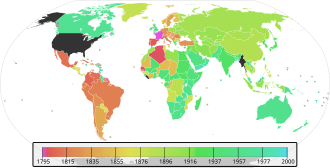Metrication
Metrication is the process of converting to the International System of Units (SI), the modern form of the metric system. This transition involves the adoption of metric units for measurement, replacing traditional systems such as the British imperial system and the United States customary units. Metrication is a global movement aimed at standardizing measurements to facilitate international trade, scientific communication, and everyday transactions.
History
The concept of metrication began in France during the late 18th century, following the French Revolution. The French government sought to standardize measurements to eliminate the confusion caused by the multitude of local units. In 1799, the metric system was officially adopted in France, setting a precedent for other countries. Over the following centuries, the movement towards metrication gained momentum, with many countries either partially or fully adopting the metric system.
Advantages
The primary advantage of metrication is its simplicity and universality. The metric system is decimal-based, making calculations easier and reducing the chance of errors. It facilitates international trade and cooperation, as measurements do not need to be converted between different systems. Additionally, the metric system is extensively used in science and engineering, making it essential for global scientific communication and technological development.
Global Adoption
The extent of metrication varies by country. Most nations have officially adopted the metric system and have phased out traditional units in favor of metric units. However, a few countries, notably the United States, continue to use their traditional systems alongside the metric system, especially in consumer products and everyday life. The process of full metrication in these countries is often met with resistance due to cultural and practical reasons.
Challenges
The challenges of metrication include the cost of converting existing systems and the resistance from sectors of the population accustomed to traditional units. In countries with a long history of using imperial or customary units, such as the United Kingdom and the United States, there is a significant sentimental attachment to traditional measurements, making the transition more difficult.
Metrication Process
The process of metrication typically involves legislation mandating the use of metric units, public education campaigns to familiarize the population with the new system, and the gradual phasing out of traditional units. In some cases, dual labeling (displaying both metric and traditional units) is used to ease the transition.
Conclusion
Metrication represents a significant step towards global standardization of measurements. While the process has been largely successful worldwide, challenges remain in fully implementing the metric system in certain countries. Despite these challenges, the benefits of a universal measurement system in promoting international understanding and cooperation are widely recognized.
| This article is a stub. You can help WikiMD by registering to expand it. |
Transform your life with W8MD's budget GLP-1 injections from $125.
W8MD offers a medical weight loss program to lose weight in Philadelphia. Our physician-supervised medical weight loss provides:
- Most insurances accepted or discounted self-pay rates. We will obtain insurance prior authorizations if needed.
- Generic GLP1 weight loss injections from $125 for the starting dose.
- Also offer prescription weight loss medications including Phentermine, Qsymia, Diethylpropion, Contrave etc.
NYC weight loss doctor appointments
Start your NYC weight loss journey today at our NYC medical weight loss and Philadelphia medical weight loss clinics.
- Call 718-946-5500 to lose weight in NYC or for medical weight loss in Philadelphia 215-676-2334.
- Tags:NYC medical weight loss, Philadelphia lose weight Zepbound NYC, Budget GLP1 weight loss injections, Wegovy Philadelphia, Wegovy NYC, Philadelphia medical weight loss, Brookly weight loss and Wegovy NYC
|
WikiMD's Wellness Encyclopedia |
| Let Food Be Thy Medicine Medicine Thy Food - Hippocrates |
Medical Disclaimer: WikiMD is not a substitute for professional medical advice. The information on WikiMD is provided as an information resource only, may be incorrect, outdated or misleading, and is not to be used or relied on for any diagnostic or treatment purposes. Please consult your health care provider before making any healthcare decisions or for guidance about a specific medical condition. WikiMD expressly disclaims responsibility, and shall have no liability, for any damages, loss, injury, or liability whatsoever suffered as a result of your reliance on the information contained in this site. By visiting this site you agree to the foregoing terms and conditions, which may from time to time be changed or supplemented by WikiMD. If you do not agree to the foregoing terms and conditions, you should not enter or use this site. See full disclaimer.
Credits:Most images are courtesy of Wikimedia commons, and templates, categories Wikipedia, licensed under CC BY SA or similar.
Contributors: Prab R. Tumpati, MD






